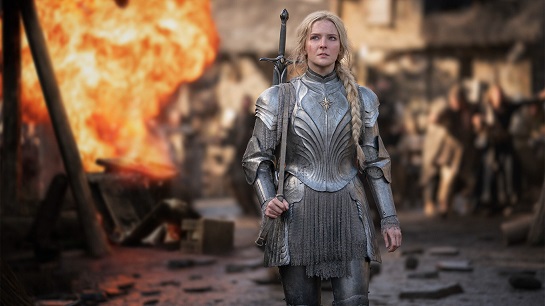 |
| Morfydd Clark as Galadriel in The Rings of Power |
Back when Peter Jackson’s Lord of the Rings movies first dropped, I remember disagreeing with this kid at the university I attended. He angrily disputed the characterization of Faramir in The Two Towers, a characterization which, in fairness, was at odds with the novel. “He’s the good son!” this kid argued. “His entire character point is that he isn’t tempted by the Ring; he shrugs off its influence and helps Frodo achieve his goals!”
Everyone around him, me included, tried to reason with him. Faramir, in the novel, literally sits Frodo down with some tea, talks out his history, and finally pledges to aid Frodo’s quest. However, we all agreed, that would’ve been talky and boring in a strictly visual medium like film. Characters solving disagreements with language is satisfying in prose, but not on screen; that’s why the Council of Elrond—20,000 words in Tolkein—was similarly reduced in the first movie.
Nothing doing. This kid adamantly insisted that his mental construct of Faramir’s character, and only his mental construct, deserved depicted onscreen. When everyone around him presented carefully constructed, evidence-based reasoning that language-driven scenes, performed mostly sitting down, make boring cinema, he simply got increasingly angry. “But he’s the good son,” this kid shouted, the same thing he’d already been saying.
I recalled this kid, and his angry one-note assertion, with the online reaction to Amazon Studios’ The Rings of Power, which dropped last week. The usual suspects crawled from the online woodwork with time-tested reasons why the adaptation, based on backstory notes which Tolkein published as an appendix, supposedly deviated from the author’s vision. But when they say “the author’s vision,” these amateur critics clearly mean their own mental construct.
Not all comments were bad-faith. Some complained about the mostly English and New Zealand actors playing Harfoots with faux Irish accents almost as off-base as Dick Van Dyke’s notorious Cockney. Meanwhile Owain Arthur as Durin, prince of Kazad-dûm, is an over-the-top caricature of an angry Glaswegian coal miner. Serious fans might question these easy choices in devising characters whom Tolkein didn’t necessarily characterize thus.
However.
An appalling number of critics complain about the presence of non-White actors in their supposedly lily-white Middle Earth. Showrunners for The Rings of Power cast British comedian Lenny Henry as a Harfood (Hobbit) leader and Puerto Rican actor Ismael Cruz Córdova as an Elven sentry, among others. Unpaid reviewers, many using pseudonyms, have rate-bombed the first two episodes on Reddit and Rotten Tomatoes for this shirttail diversity.
 |
| Sir Lenny Henry (center) with Sara Zwangobani and Thusitha Jayasundera in The Rings of Power |
Others have attacked Welsh actress Morfydd Clark’s portrayal of young Galadriel. Like that kid in college, these reviewers have a particular image in their heads, and respond with rage when it’s violated. Clark plays Galadriel like a youthful, sometimes vindictive warrior, not the slow-moving pre-Raphaelite monarch Cate Blanchett portrayed in Peter Jackson’s movies. (By contract, this series is unrelated to Jackson’s movies, though they clearly overlap stylistically.)
To constrain these bad-faith reviewers, Amazon has, among other things, began limiting access to customer reviews. (This didn't begin with The Rings of Power, but it definitely pushed the cause.) Answering these troll-like reviewers on Twitter and Instagram has become a full-time job for some fans. I wish we could politely decline to engage the trolls, but we can’t. As Kelly Marie Tran learned, the trolls’ combined might and lack of shame have changed the landscape.
Popular social media has made outrage marketing remarkably profitable. Trolls use bad-faith argument to steer the internet’s attention to themselves, usually by provoking normal people into outrage, which lets them claim moral high ground. Politicians, comedians, and ordinary people who enjoy the spotlight use the internet to antagonize those blessed with empathy and honor. They don’t care about outcomes; they only want attention.
Admittedly, I’m biting the hand that feeds. I get virtually all my blog business through Facebook, Twitter, and Instagram; the utility of read-write social media has made it possible for me to share my opinion worldwide. But I attempt to communicate in good faith, something painfully lacking in anonymous media like Reddit and Chan boards. And because I don’t stoke outrage, probably not many people will ever read this essay.
My college friend wasn’t a troll. When The Two Towers dropped in 2002, social media barely existed, and I doubt he would’ve misused Reddit’s reach if he’d had it. But he had the same bad-faith deafness to reason, and the arrogance to believe his opinion should carry weight. And that kind of attitude is dangerous today, as we keep learning.
No comments:
Post a Comment